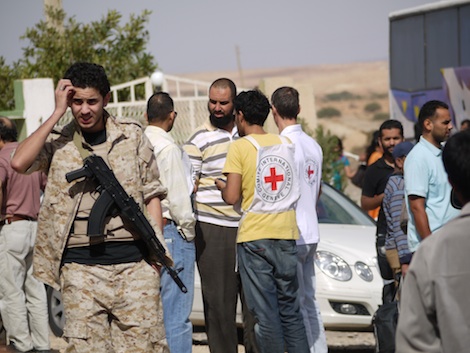By George Grant.

Tarhuna, 23 October:
Displaced refugees from Bani Walid have said that the military now controls the populated districts surrounding the . . .[restrict]town and are making frequent raids into the centre, using both light and heavy weapons.
The assertion comes amidst an ongoing exodus of civilians fleeing the fighting, with tens of thousands now believed to have left the hill-town.
Relief workers from the International Committee of the Red Cross estimated yesterday that as many as 5,000 families, or some 25,000 people, had fled Bani Walid into the Urban area alone, with the total figure believed to be much higher.
The Bani Walid Crisis Management Centre has claimed that almost 10,000 families have fled in total. It is estimated that Bani Walid and its environs are home to around 80,000 people.
Refugees are fleeing the town in every direction, with thousands known to have headed to Tarhouna with more passing on to other towns including Tripoli.
Few if any native residents are taking the main roads out of the Bani Walid, preferring instead to take the hazardous desert tracks in attempt to evade security forces who have a list of some 1,000 names wanted for arrest.
“They have taken the areas of Mordum, Shmeagh, Tniena and the airport”, said one refugee in Tarhouna, who wished only to give his name as Mohammed.
“They have also been coming into the centre, but they cannot stay in the same place for a long time. They come inside, then they run away. They are using everything against us. The grads are firing everywhere. It is not safe for civilians.”
On Friday, the Libya Herald was able to reach Shmeagh, a populated district some 30 kilometres east of Bani Walid and confirm it was under the military’s full control. The paper has been unable to visit the other districts, or the town centre itself, since 9 October.
Speaking from inside a hastily-converted girls school in Tarhouna, refugees said that around 150 families had passed through its gates in the last ten days.
They also said that the Bani Walid channel had listed the names of more than 150 people who had been killed over the same period.
“They are attacking again today and it is very strong”, said another man calling himself Mohammed, who fled Bani Walid with his 13-strong family early this morning and arrived whilst the Libya Herald was still at the school a little before 15:30 this afternoon.
“The soldiers came into the middle of Bani Walid yesterday but there was a strong fight and they left. Last night, a heavy missile landed near my home so we decided to leave.”
On the main road towards Bani Walid from Tarhouna, one local commander said that security forces had intercepted some 250 families fleeing Bani Walid yesterday alone.
“We brought 250 families from the desert area yesterday”, said Ali Shiltat, a former army colonel now in charge of a unit from the Libya Shield brigade. “Our duty is to help civilians, and many of the families we found were happy to see us”.
Shiltat also disclosed the size of the list of names wanted for arrest by the authorities following the enactment of Resolution No. 7 on 25 September.
“We have the list, and on it are about 1,000 names”, he said. “Many of the names are former members of the 32nd Brigade [the Khamis Brigade]. In our area, we have only caught three of them so far.”
Some 30 kilometres north of Bani Walid, at a place known as the Malta Mosque, a team from the International Committee of the Red Cross had arrived today to intercept the displaced whilst a field hospital with 15 doctors was also being established.
The ICRC have said that Urban and Temesla Wadi Mansour are the main transit points for civilians fleeing their homes, and that ICRC staff together with Libyan Red Crescent volunteers are distributing plastic sheeting, mattresses, blankets, kitchen sets and hygiene items to the many displaced in Urban. Yesterday, the ICRC set up a temporary base in Tarhuna to help facilitate its humanitarian operations.
In addition, 17 tonnes of basic food supplies (rice, oil, beans, salt, sugar, tea and tomato paste) and other items are leaving Tripoli today for onward distribution to the displaced in Urban, Temesla Wadi Mansour and other areas.
At the Malta Mosque, a bus jointly commissioned by the Bangladeshi and Indian embassies arrived this morning, ready to pick up nationals from both countries who had been unable to leave Bani Walid before yesterday.
“We are collecting 41 Indians and 91 Bangladeshis today”, said Mohammed Hassan, first secretary at the Bangladeshi embassy. “We collected 114 Bangladeshis yesterday”. The Libya Herald also encountered a small cluster of six Chadians at the site.
Back on the outskirts of Tarhouna, a group of Indian employees from Bani Walid’s Wool & Textile Company said that around 120 of their countrymen had been forced to leave, along with around 50 from Pakistan.
“Yesterday, we walked 30 kilometres to the Malta Mosque”, said one. “We left the factory five days ago, but the militia from Bani Walid would not allow us out until yesterday. Bombs are falling all the time. Our factory was hit three times since Wednesday.”
The men, most of whom said they had lived in Bani Walid for between 20 and 30 years, said that the current assault surpassed what they had endured last October, when the town was attacked during the revolution.
“Last time it was NATO, and their bombs were so much more targeted; they didn’t shoot civilians”, said another member of the group. “This time, the missiles are hitting anywhere.”
Libya Herald originally reported here that “17,000 tonnes” of supplies had been sent to Bani Walid. This was a figure given us in error by the Red Cross. [/restrict]








